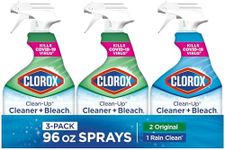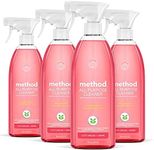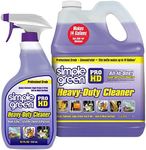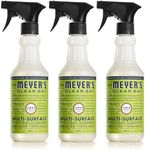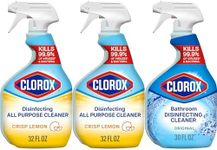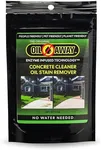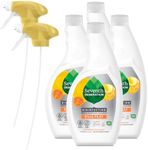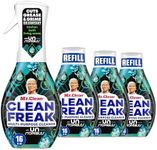Buying Guide for the Best Kitchen Cleaners
Choosing the right kitchen cleaner can make a significant difference in maintaining a clean and hygienic kitchen. The right product will not only clean effectively but also be safe for your surfaces and your health. When selecting a kitchen cleaner, consider the type of surfaces you need to clean, the kind of dirt or stains you typically encounter, and any specific needs such as eco-friendliness or sensitivity to chemicals. Here are some key specifications to help you make an informed decision.Surface CompatibilitySurface compatibility refers to the types of surfaces the cleaner is safe to use on, such as stainless steel, granite, glass, or wood. This is important because using the wrong cleaner can damage your surfaces. Cleaners are often labeled for specific surfaces, so look for this information on the packaging. If you have a variety of surfaces in your kitchen, you might want a multi-surface cleaner. For specialized surfaces, choose a cleaner specifically designed for that material to ensure it cleans effectively without causing damage.
Cleaning PowerCleaning power indicates how effectively a cleaner can remove dirt, grease, and stains. This is crucial for maintaining a hygienic kitchen. Cleaners range from mild to heavy-duty. Mild cleaners are suitable for everyday cleaning and light messes, while heavy-duty cleaners are better for tough, baked-on grease and grime. Consider your typical cleaning needs: if you cook frequently and deal with a lot of grease, a stronger cleaner might be necessary. For regular maintenance, a milder cleaner should suffice.
IngredientsThe ingredients in a cleaner determine its safety and environmental impact. This is important for both health and ecological reasons. Cleaners can contain chemicals that may be harsh or toxic, so it's essential to read the label. Natural or eco-friendly cleaners use plant-based ingredients and are generally safer for your health and the environment. If you have allergies, sensitivities, or prefer to avoid harsh chemicals, look for cleaners labeled as non-toxic, biodegradable, or free from specific harmful substances like ammonia or bleach.
ScentThe scent of a cleaner can affect your overall experience while using it. This is important for personal comfort and preference. Cleaners come in a variety of scents, from citrus and floral to unscented. If you are sensitive to strong smells or prefer a neutral environment, an unscented or lightly scented cleaner might be best. On the other hand, if you enjoy a fresh-smelling kitchen, you might prefer a cleaner with a pleasant fragrance. Consider any allergies or sensitivities to fragrances when making your choice.
Application MethodThe application method refers to how the cleaner is applied, such as spray, wipe, or foam. This is important for ease of use and effectiveness. Sprays are convenient for quick and even application, wipes are handy for small messes and quick clean-ups, and foams can be effective for clinging to vertical surfaces or tough stains. Think about your cleaning habits and preferences: if you like quick and easy cleaning, sprays or wipes might be ideal. For more thorough cleaning sessions, a foam or liquid cleaner might be more effective.
Disinfecting PropertiesDisinfecting properties indicate whether a cleaner can kill bacteria, viruses, and other pathogens. This is crucial for maintaining a hygienic kitchen, especially when handling raw meat or other potentially hazardous foods. Some cleaners are specifically formulated to disinfect, while others are primarily for cleaning. If hygiene is a top priority, look for cleaners labeled as disinfectants or with antibacterial properties. For general cleaning, a regular cleaner might be sufficient, but you may want to have a disinfectant on hand for occasional deep cleaning.

